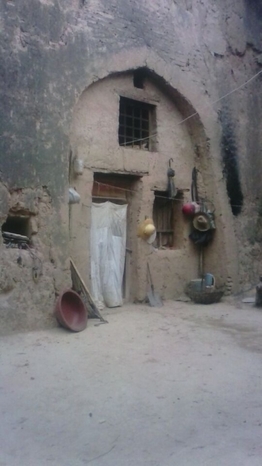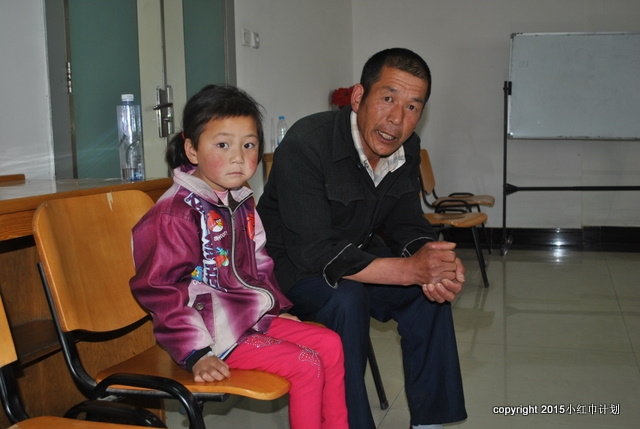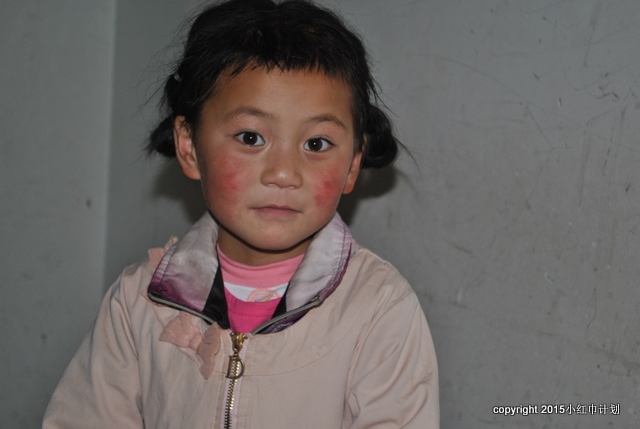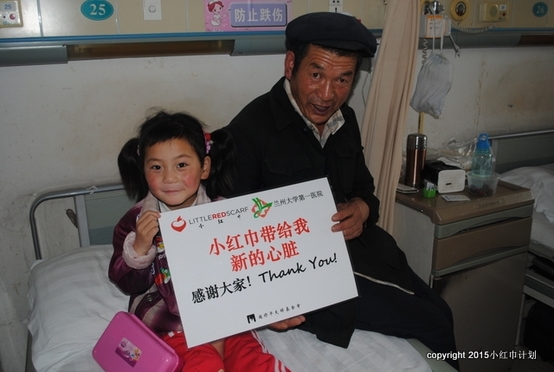 Tingting’s family lives in Longdong, Gansu. There, many still live in caves. Tingting’s family lives in Longdong, Gansu. There, many still live in caves. Little Red Scarf is in Lanzhou, Gansu and Yunnan province and provides financial support and encouragement to children suffering from congenital heart disease. In addition, they provide families with post-operative care and help the children sustain a healthy lifestyle. The first time I saw Tingting was in a doctor’s office. Dr. Zhang was asking a group of people, “Does anyone have low-income medical insurance? If you do, you can apply for government serious illness relief funds. If you don’t, we have …” Before Dr. Zhang could finish, someone next to him responded, “Yes, we have low-income medical insurance.” Following the sound of that person’s voice, I noticed a little girl looking around in the crowd and an old person next to her because, in this crowd, they are the most conspicuous. The elderly wore an old-fashioned, self-made Chinese tunic suit (the type where the buyer selects the fabric and brings it to a tailor to make). A tunic suit has anything but disappeared in the cities. Although sometimes some senior citizens from rural areas would don the suit, youth nowadays never dress like that. The little girl has a head of messy hair and bright red cheeks. The next time I saw Tingting was on the next day, when Dr. Zhang called me, telling me that a little girl who came yesterday. Her father did not understand what the doctor said. Their low-income insurance cannot be used. Dr. Zhang asked me to drop by the heart surgery department if I have time. The little girl’s family condition is very special, so she should fit Little Red Scarf’s support criteria. So I went to the hospital ward to find Tingting’s father. I told him I am Ms. Yun from Little Red Scarf. I pointed to a Little Red Scarf poster that happened to be hanging on the wall. I told him that the doctor told me to come find you. Tingting’s father continued to stare at me expressionlessly. I repeated that I am Ms. Yun from Little Red Scarf and asked him to go with me to the doctor’s office. To some patients’ relatives in the hospital (especially those who have never been far from their hometown and those who are illiterate), if you are not wearing a white robe, they will not respond to you no matter whom you say you are. But if you can accurate tell them their child’s physician’s name and tell them that the doctor is looking for them, they will for sure go with you. I know that, no matter how much I talk, if Dr. Zhang does not explicitly tell Tingting’s father that I am a LRS staff, LRS can help fund your child’s surgery and can be trusted, Tingting’s father will not listen to anything I have to say. Although he cannot read, he knows to protect himself by not responding to my inquiries. Luckily, Dr. Zhang’s words completely changed Tingting’s father’s attitude. He immediately nodded and said, “Mhm.” I first told Tingting’s father what Little Red Scarf is. The phone number on the poster happens to be mine. I told them in the simplest terms how we can help and why we are here. After finishing, I asked Tingting’s father, “Do you understand?” He smiled and said, “Ha, I’m sure what you mean,” in a thick, rural accent. From first sight, I knew that our communication would require a lot more time than with the average family, but when Tingting’s father told me directly that he does not understand what I am saying, I began to wonder if my mandarin is not quite accurate. To need to worry, to an experienced caseworker like me, although I was a little surprised, I still felt in control of the situation. If he cannot understand me the first time, I can repeat myself three times. He will eventually understand.
Luckily, after I repeated myself using as few words as possible, Tingting’s father nodded ambiguously. I repeated myself a few times while he seems to understand and then asked him if he had any questions for me. Tingting’s father told me, “I cannot read, I can only write my own name. I do not have any other questions.” As long as Tingting’s father is willing to listen to what I have to say, the rest should be easy. Little Red Scarf posters are all over the walls inside the hospital wards, so very few parents will doubt our legitimacy. Coupled with recommendations and proof from the doctors, our relationships with the families progress very quickly. Later, Tingting’s father began to hand me his identification documents from his pocket. When he gave me his ID card, I saw the bag he was holding. I was shocked. It was a very ordinary plastic bag used to hold cooking salt. I remember that 20 years ago, when I was in elementary school, many classmates, including myself, would use bags similar to that to bring steamed buns to school. What I did not expect was that Tingting’s father would use this ordinary bag to store his family’s household register book, his ID card, and their rural cooperative medical care documents. I cannot help but wonder what is Tingting’s home like? How many years has it been since her father left his hometown? Later, when I was chatting with Tingting’s father, my questions were answered (you can reference Tingting’s Project Children Summary). Tingting’s parents are both old. Her mother has been struggling with mental health. Before Tingting, the couple had another daughter, who died when we was three in an accident. Her mother was greatly depressed after the incident. Only with Tingting’s arrival did her mother’s state of mind gradually recover. Now, Tingting is the focus of her family and holds the family’s hopes for the future. Her father would always look at Tingting lovingly. Although he himself cannot speak mandarin and has trouble communicating with others, when he sees his daughter using poor mandarin communicating with other people in the hospital, he would beam with pride and happiness. People who know Tingting in the hospital would all say, “This girl is so clever.” I agree. I feel like her eyes can speak, and each action of hers is so cute and lovable as she lovingly snuggles with her father. The father and daughter live a very frugal life at the hospital. Being his first time leaving his hometown, the father had to take on loans to afford the surgery costs. Because they lived a simple life at home, when they came to the capital of the province, everything seemed new and exciting. Even the steamed buns in the hospital cafeteria taste better than the buns they make at home. But of course the buns here are not as filling as the ones back home. At each meal, the father and daughter would squat around a small stool. Each meal would be very simple and cheap. We reported Tingting’s family condition to Little Red Scarf’s U.S. office and sent in an application oh behalf of her family for the LRS Care Plan. After being accepted, we sent Tingting and her father 2000 yuan of donations. This money is partly for Tingting’s and her father’s living costs at the hospital and partly to pay for medicine for Tingting’s mother. When Tingting’s father was receiving the money, we noticed a small pocket on his person. The pocket’s color did not match with his shirt or jacket and was attached to his shirt with a pin. We can easily infer that it was a temporary pocket sewn on the shirt before coming to the hospital to store important documents. On May 25th, Tingting successfully underwent surgery. On June 2nd, she was discharged from the hospital. Our staff prepared a surprise for Tingting, giving her some photos we took of her during her stay at the hospital. The little girl could not stop grinning after she saw the photos. When we asked Tingting which photo was her favorite, she chose without hesitation the one with her and her father. We know that, deep inside, Tingting has another small wish – to take a photo with her father and mother. The doctor told Tingting’s father when they were leaving the hospital that they must remember to come back after a month for a reexamination. Tingting’s home is very far from Lanzhou. They must ride on a bus for an entire day. We are worried that her father would to take her for a reexamination. So when they were leaving the hospital, we reminded them once and again to remember to come back and call us when they do. Original Article Written by Yunyun Jie, translated by Allison Zhang, edited by Yanyan Zhang Comments are closed.
|
TFISH FUND BLOGWe update news and reports directly from the field written by our NGO partners daily. Top PostsPHOTOS & VIDEOSIN THE NEWSCategories
All
Archives
August 2017
|
|
© Copyright 2011. All rights reserved.
171 Main St. #658 , Los Altos, CA 94022 | [email protected] | 501(c)(3) Tax ID: 45-2885139 |





 RSS Feed
RSS Feed